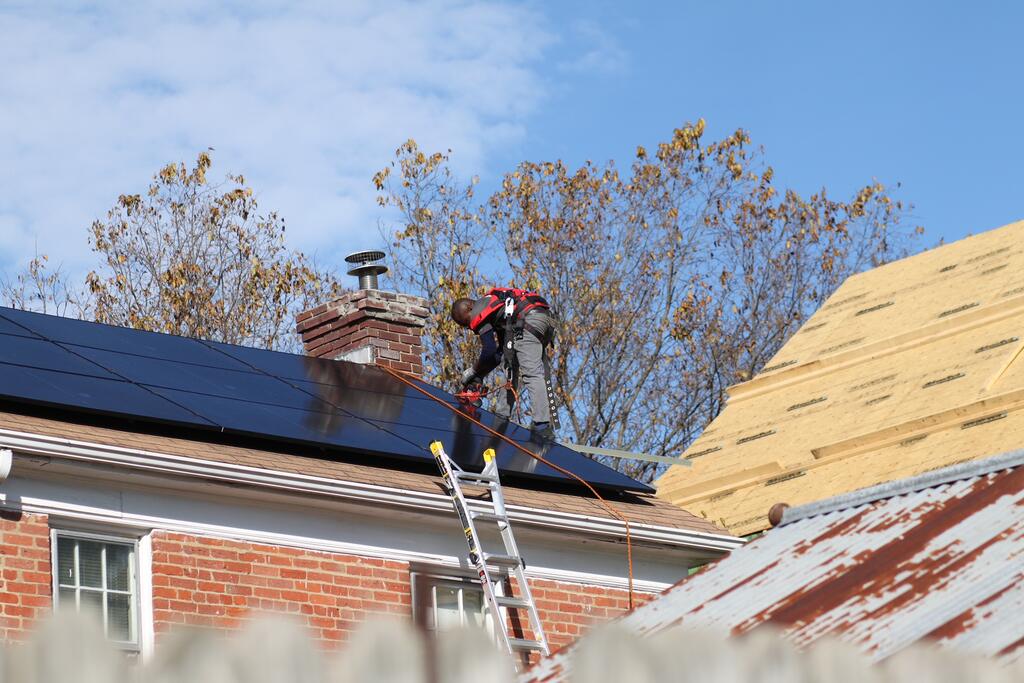
Wondering about the financial incentives to go solar? You may have heard of the federal solar tax credit. Currently at 30%, the federal solar tax credit is a big draw for homeowners considering solar. But how does the tax credit work, and who’s eligible?
How does the federal solar tax credit work?
The year you install solar, you can claim a solar tax credit (also sometimes called an Investment Tax Credit, or ITC) on your federal income taxes by filling out IRS Form 5695. The solar tax credit is 30% of the total system costs, including the cost of equipment and labor. This isn’t a deduction, like small business expenses or charitable donations, but a dollar-for-dollar reduction in the taxes you owe the government.
And good news: the tax credit will stay at 30% until 2033, thanks to the passing of the Inflation Reduction Act of 2022. In 2033, it will go down to 26%, and to 22% in 2034. By 2035, Congress will need to decide if they will renew it or let it expire. So you’ve got many years yet to take advantage of the credit.
The Inflation Reduction Act also included battery storage technology for the tax credit, so if you opt for an energy storage device, you’ll be able to add its price tag to the total cost to calculate your credit.
Here are all the expenses included:
- Solar panels
- Contractor labor costs — hey, that’s us! Whatever you pay us for the installation (including permitting fees and the cost of inspection) is part of the total
- Mounting equipment, such as rails, microinverters, and wires
- Battery storage systems with a capacity rating of three kilowatt-hours or more
Add all those up, and you’ll receive 30% of the total. According to the Office of Energy Efficiency & Renewable Energy, there is no maximum amount you can claim.
Who’s eligible for the federal solar tax credit?
Solar system owners are eligible. If you paid for your system in cash or through a solar loan, you’ll receive the federal solar tax credit. If you went with a PPA, under that agreement Uprise counts as the system owner, and we receive the tax credit.
Another thing to know is that there is no income limit — all taxpayers, as long as you have a tax liability, in any income bracket can claim the federal solar tax credit.
How many times can I claim the federal solar tax credit?
You can claim the 30% solar tax credit just once, the year you install your solar panel system. One thing to note, however, is that the credit is nonrefundable. You won’t get a refund if the credit amount is more than what you owe. But you can carry the credit forward and apply it to future years.

If I made repairs to my roof to go solar, do those count for the tax credit?
No; according to the Internal Revenue Service (IRS), roofing materials or structural components don’t count for the solar tax credit, since they serve a structural or roofing function.
What if my system was installed in one year, but I didn’t receive permission to operate until the next year?
You claim the federal solar tax credit once your solar panels start officially generating clean power. So if our install crew came out and put the panels on your roof in December 2023, but you didn’t get permission from your utility company to turn them on until February 2024, you’d have to wait for that tax credit until you file your 2024 tax return. Utility companies can take two to four weeks (or even more) to approve interconnection paperwork, so that’s one thing to keep in mind as you’re deciding when to go solar.
What if I work from home, or conduct business from the property where my solar panels were installed?
You can still claim the credit — as long as the solar system is used mainly for residential purposes. If you’re concerned about this, we recommend speaking with an accountant.

What if I buy a home with rooftop solar? Can I claim the federal solar tax credit?
You won’t receive the federal solar tax credit if you purchase a home with a solar system in place. The credit can only be claimed the year the system is installed. So you’ll miss out on the tax credit — but you will receive the renewable energy from the panels and be able to power your home sustainably, as well as paying less for electric bills. (In other words, even if you can’t claim the tax credit, we still think it’s a good deal!)
Do other incentives for installing solar impact the federal tax credit?
They can — but most DMV residents don’t need to worry about this. Here’s why. Some utilities provide rebates for homeowners to install solar, and that rebate would need to be subtracted from the system total before calculating the tax credit. However, Pepco, Dominion, and BGE do not offer rebates for solar. Whether that’s a good thing or a bad one is up for debate, but you won’t have to worry about subtracting it from your system total.
And while Solar Renewable Energy Credits do count as taxable income, they don’t impact the federal solar tax credit, just your gross income.
Maryland does offer a clean energy rebate of $1,000 for solar, and you would need to subtract that from your system total.
Can I claim the federal solar tax credit for other home improvements?
Yes! You can claim the federal solar tax credit for these projects:
- Solar water heaters
- Fuel cells
- Small wind energy turbines
- Geothermal heat pumps

Did the Inflation Reduction Act make any other changes to the federal solar tax credit?
Yes. With the Inflation Reduction Act’s passage, nonprofits can now benefit from the federal solar tax credit through what’s called direct pay. According to the White House, tax-exempt groups will receive the full value of the tax credit as a payment. Nonprofits can use direct pay for solar panel installations, but also for other clean technology projects like electric car charging infrastructure, community solar, or battery storage. State, local, and tribal governments; rural energy cooperatives; and foundations, houses of worship, schools, and hospitals can receive direct pay.
What if I have more questions?
We’d like to note that although we’ve drawn from government sources like the IRS and the Department of Energy for this post, we’re not accountants! Check with your tax advisor if you have any specific questions for your tax return. But we’d be happy to answer any informational or solar questions; just reach out to us at (202) 280-2285 or email us at info@uprisesolar.com.
The solar tax credit is great for homeowners, and it’s also great for the solar industry! According to the Solar Energy Industries Association, “Since the ITC was enacted in 2006, the U.S. solar industry has grown by more than 200x — creating hundreds of thousands of jobs and investing billions of dollars in the U.S. economy in the process.” We’re glad the solar tax credit will be around for many more years to come!
Schedule Consultation
This is a standard boilerplate Gravity Form created by the 321 Management plugin.
"*" indicates required fields
